|
Drake
|
|
Drake
|
Each cache entry contains: More...
#include <drake/systems/framework/cache3.h>
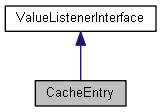
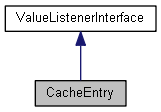
Public Types | |
| using | Calculator = std::function< void(const class AbstractSystem3 &, const class AbstractContext3 &, AbstractValue *)> |
| This is the type of a function that unconditionally computes this cache entry's value with respect to the contents of a given Context. More... | |
Public Member Functions | |
| CacheEntry () | |
| Create an empty cache entry that is not yet committed to a particular kind of abstract value. More... | |
| CacheEntry (const AbstractValue &value) | |
Create a cache entry initialized to a copy of the given value. More... | |
| CacheEntry (std::unique_ptr< AbstractValue > value) noexcept | |
Create a cache entry that takes over ownership of the given value. More... | |
| CacheEntry (const CacheEntry &source) | |
Copy constructor makes a new cache entry that has a copy of the value from source, but is marked "not current" regardless of whether source is current. More... | |
| CacheEntry (CacheEntry &&source) noexcept | |
Move constructor moves the value and preserves the is_current status of the source in the destination. More... | |
| void | set_calculator (const Calculator &calculator) |
| Set the function to be used when we need to recompute this cache entry's value. More... | |
| const Calculator & | get_calculator () const |
| Set the function to be used when we need to recompute this cache entry's value. More... | |
| void | ResetAbstractValue (std::unique_ptr< AbstractValue > value) |
| Set the AbstractValue type stored in this CacheEntry by replacing the existing one (if any) with the supplied one. More... | |
| void | ResetAbstractValue (const AbstractValue &value) |
| Set the AbstractValue type stored in this CacheEntry by replacing the existing one (if any) with a copy of the supplied one. More... | |
| void | RealizeCacheEntry (const AbstractSystem3 &system, const AbstractContext3 &context) |
| bool | is_current () const |
Return the value of the is_current flag for this cache entry. More... | |
| void | set_is_current (bool is_current) |
| Mark this entry as current or not; up to caller to do this right. More... | |
| const AbstractValue & | get_abstract_value () const |
| Return a const reference to the AbstractValue contained in this cache entry, regardless of whether it is current. More... | |
| AbstractValue * | get_mutable_abstract_value () |
| Return a mutable pointer to the AbstractValue contained in this cache entry, regardless of whether it is current. More... | |
| template<class Type > | |
| const Type & | get_value () const |
Return a const reference to the value contained in this cache entry, which must be of type Type. More... | |
| template<class Type > | |
| Type * | get_mutable_value () |
Return a mutable pointer to the value contained in this cache entry, which must be of type Type. More... | |
| template<typename T > | |
| const VectorInterface< T > & | get_vector_value () const |
| template<typename T > | |
| const VectorInterface< T > * | get_mutable_vector_value () const |
| void | Invalidate () override |
| Invalidate this cache entry and notify any downstream listeners. More... | |
 Public Member Functions inherited from ValueListenerInterface Public Member Functions inherited from ValueListenerInterface | |
| virtual | ~ValueListenerInterface () |
Each cache entry contains:
A cache entry is both a prerequisite for its downstream value listeners, and a value listener registered with its upstream prerequisites.
| using Calculator = std::function<void(const class AbstractSystem3&, const class AbstractContext3&, AbstractValue*)> |
This is the type of a function that unconditionally computes this cache entry's value with respect to the contents of a given Context.
|
inline |
Create an empty cache entry that is not yet committed to a particular kind of abstract value.
|
inlineexplicit |
Create a cache entry initialized to a copy of the given value.
|
inlineexplicitnoexcept |
Create a cache entry that takes over ownership of the given value.
|
inline |
Copy constructor makes a new cache entry that has a copy of the value from source, but is marked "not current" regardless of whether source is current.
|
inlinenoexcept |
Move constructor moves the value and preserves the is_current status of the source in the destination.
The source is left empty and not current.
|
inline |
Return a const reference to the AbstractValue contained in this cache entry, regardless of whether it is current.
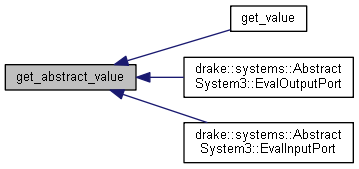
|
inline |
Set the function to be used when we need to recompute this cache entry's value.

|
inline |
Return a mutable pointer to the AbstractValue contained in this cache entry, regardless of whether it is current.
The value is returned regardless* of whether it is current.

|
inline |
Return a mutable pointer to the value contained in this cache entry, which must be of type Type.
The value is returned regardless of whether it is current. No invalidation or notification occurs.
| std::logic_error | The value did not have type Type. |

|
inline |

|
inline |
Return a const reference to the value contained in this cache entry, which must be of type Type.
The value is returned regardless of whether it is current.
| std::logic_error | The value did not have type Type. |
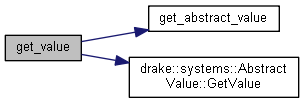
|
inline |

|
inlineoverridevirtual |
Invalidate this cache entry and notify any downstream listeners.
The value version number is incremented.
Implements ValueListenerInterface.

|
inline |
Return the value of the is_current flag for this cache entry.

|
inline |
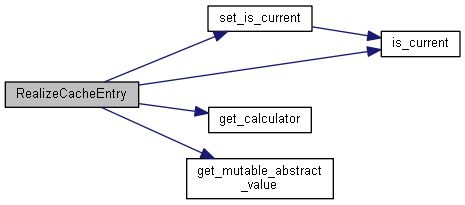

|
inline |
Set the AbstractValue type stored in this CacheEntry by replacing the existing one (if any) with the supplied one.
The CacheEntry takes ownership of the AbstractValue object.


|
inline |
Set the AbstractValue type stored in this CacheEntry by replacing the existing one (if any) with a copy of the supplied one.

|
inline |
Set the function to be used when we need to recompute this cache entry's value.

|
inline |
Mark this entry as current or not; up to caller to do this right.

